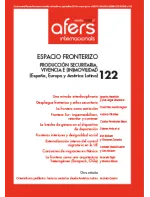International relations and peripheral Orientalism: sectarian readings from Latin America

Sectarian readings explain the conflicts in the Middle East through religious variables. This paper criticises their reproduction in Latin American international relations, which draw on the epistemological and ontological assumptions of hegemonic/Western approaches to international relations. This is not inconsequential, as it constitutes an identity politics that simultaneously constructs Western identity and reaffirms and perpetuates prejudices that “other” the Middle East. From Latin America, such readings form part of peripheral Orientalism and produce subjectivity effects that distance the Latin American region from the Global South, as well as consolidating their marginal position in global power relations.
Keywords: international relations, Latin America, peripheral Orientalism, sectarian readings, Middle East, identity
DOI: doi.org/10.24241/rcai.2019.122.2.213
>> The full text articles of this issue are available only in Spanish language
How to cite this article:
Cuadro, Mariela. «Relaciones internacionales y orientalismo periférico: lecturas sectarias desde América Latina». Revista CIDOB d’Afers Internacionals, n.º 122 (septiembre de 2019), p. 213-233. DOI: doi.org/10.24241/rcai.2019.122.2.213